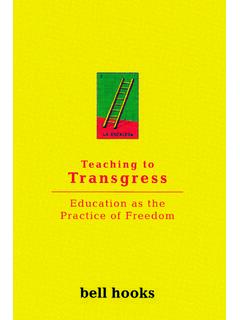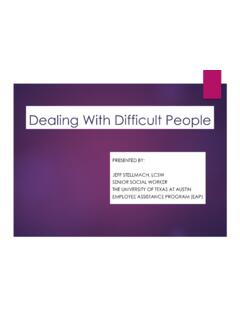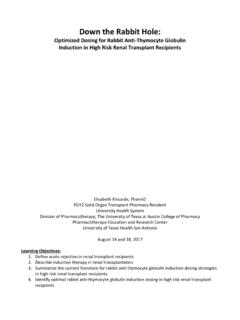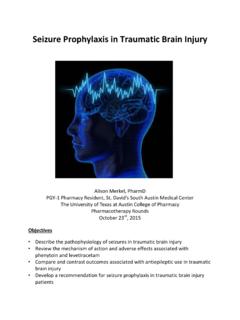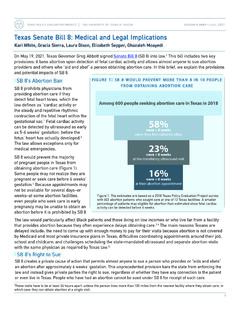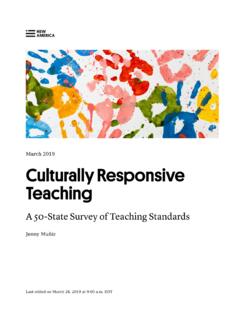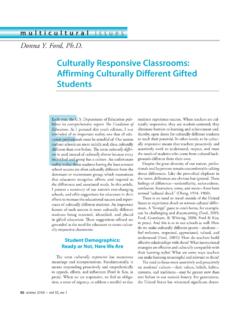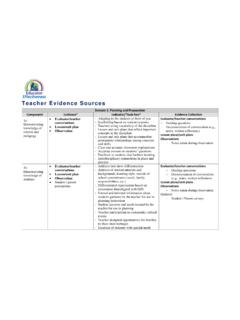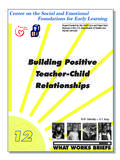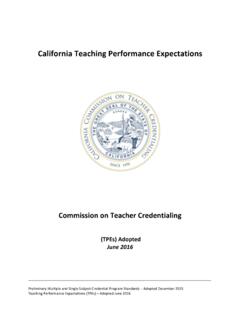Transcription of Teaching To Transgress - University Blog Service
1 Teaching toTransgressThis page intentionally left blankTeaching toTransgressEducation as the Practice of Freedombell hooksRoutledgeNew York LondonPublished in 1994 by RoutledgeTaylor & Francis Group 711 Third Avenue New York, NY 10017 Published in Great Britain by RoutledgeTaylor & Francis Group 2 Park Square Milton Park, Abingdon Oxon OX14 4 RNCopyright 1994 Gloria WatkinsAll rights reserved. No part of this book may be reprinted or reproduced or utilized in any form or by any electronic, mechanical or other means, now known or hereafter invented, including photocopying and recording or in any inform ation storage or retrieval system, without permission in writing from the of Congress Cataloging-in-Publication Data hooks, to Transgress : education as the practice of freedom / bell hooksp.
2 IndexISBN 0-415-90807-8 ISBN 0-415-90808-6 (pbk.)1. Critical pedagogy. 2. Critical thinking Study and Feminism and education. 4. Teaching . I. '5 dc20 94-26248 CIPto all my students, especially to LaRon who dances with angelsin gratitude for all the times we start over begin again renew our joy in learning.. to begin always anew, to make, to reconstruct, and to not spoil, to refuse to bureaucratize the mind, to understand and to live life as a process live to become .. Paulo FreireThis page intentionally left blankContentsIntroduction ITeaching to Transgress1 Engaged Pedagogy 132 A Revolution of Values 23 The Promise of Multicultural Change3 Em bracing C hange 35 Teaching in a Multicultural World4 Paulo Freire 455 T heory as L iberatory Practice 596 Essentialism and Experience 77 Holding My Sister s Hand 93 Feminist SolidarityFeminist Thinking 111In the Classroom Right NowFeminist Scholarship 119 Black ScholarsBuilding a Teaching Community 129A DialogueLanguage 167 Teaching New Worlds /New WordsConfronting Class in the
3 Classroom 177 Eros, Eroticism, and the Pedagogical Process 191 Ecstasy 201 Teaching and Learning Without LimitsIndex78 91011121314209 IntroductionTeaching to TransgressIn the weeks before the English Department at Oberlin Col lege was about to decide whether or not I would be granted tenure, I was haunted by dreams of running away of disap pearing yes, even of dying. These dreams were not a response to fear that I would not be granted tenure. They were a response to the reality that I would be granted tenure. I was afraid that I would be trapped in the academy of feeling elated when I received tenure, I fell into a deep, life-threatening depression.
4 Since everyone around me believed that I should be relieved, thrilled, proud, I felt guilty about my real feelings and could not share them with any one. The lecture circuit took me to sunny California and the New Age world of my sister s house in Laguna Beach where I was able to chill out for a month. When I shared my feelings with my sister (she s a therapist), she reassured me that they were entirely appropriate because, she said, You never wanted2 Teaching to Transgressto be a teacher . Since we were little, all you ever wanted to do was write.
5 She was right. It was always assumed by everyone else that I would become a teacher . In the apartheid South, black girls from working-class backgrounds had three career choices. We could marry. We could work as maids. We could become school teachers. And since, according to the sexist thinking of the time, men did not really desire smart women, it was assumed that signs of intelligence sealed one s fate. From grade school on, I was destined to become a the dream of becoming a writer was always present with in me.
6 From childhood, I believed that I would teach and write. Writing would be the serious work, Teaching would be the not-so-serious-I-need-to-make-a-living job. Writing, I believed then, was all about private longing and personal glory, but Teaching was about Service , giving back to one s community. For black folks Teaching educating was fundamentally polit ical because it was rooted in antiracist struggle. Indeed, my all black grade schools became the location where I experienced learning as all our teachers at Booker T. Washington were black women.
7 They were committed to nurturing intellect so that we could become scholars, thinkers, and cultural workers black folks who used our minds. We learned early that our devotion to learning, to a life of the mind, was a counter-hegemonic act, a fundamental way to resist every strategy of white racist coloni zation. Though they did not define or articulate these practices in theoretical terms, my teachers were enacting a revolutionary pedagogy of resistance that was profoundly anticolonial. Within these segregated schools, black children who were deemed exceptional, gifted, were given special care.
8 Teachers worked with and for us to ensure that we would fulfill our intel lectual destiny and by so doing uplift the race. My teachers were on a fulfill that mission, my teachers made sure they knew us. They knew our parents, our economic status, where we wor shipped, what our homes were like, and how we were treated in the family. I went to school at a historical moment where I was being taught by the same teachers who had taught my mother, her sisters, and brothers. My effort and ability to learn was always contextualized within the framework of generational family experience.
9 Certain behaviors, gestures, habits of being were traced school then was sheer joy. I loved being a stu dent. I loved learning. School was the place of ecstasy plea sure and danger. To be changed by ideas was pure pleasure. But to learn ideas that ran counter to values and beliefs learned at home was to place oneself at risk, to enter the dan ger zone. Home was the place where I was forced to conform to someone else s image of who and what I should be. School was the place where I could forget that self and, through ideas, reinvent changed utterly with racial integration.
10 Gone was the messianic zeal to transform our minds and beings that had characterized teachers and their pedagogical practices in our all-black schools. Knowledge was suddenly about information only. It had no relation to how one lived, behaved. It was no longer connected to antiracist struggle. Bussed to white schools, we soon learned that obedience, and not a zealous will to learn, was what was expected of us. Too much eagerness to learn could easily be seen as a threat to white we entered racist, desegregated, white schools we left a world where teachers believed that to educate black children rightly would require a political commitment.
